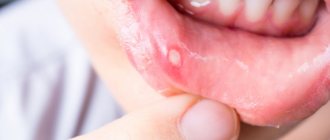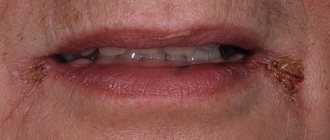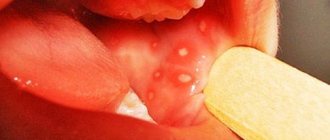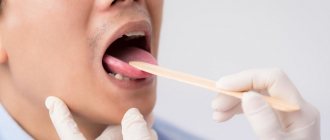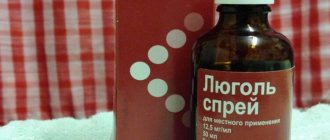Author of the article:
Soldatova Lyudmila Nikolaevna
Candidate of Medical Sciences, Professor of the Department of Clinical Dentistry of the St. Petersburg Medical and Social Institute, Chief Physician of the Alfa-Dent Dental Clinic, St. Petersburg
During pregnancy, a woman's body undergoes various changes. She ceases to be the same as she was before the child was conceived. Such updates occur in her that change her entire usual state. The hormonal background changes, a hormonal surge occurs. At this time, “sores” may appear that the expectant mother had no idea about before. One of the probable diseases may be stomatitis. According to statistics, this disease is detected to one degree or another in every second pregnant woman.
Stomatitis is a common mucosal disease. This inflammation is common in both adults and children. According to statistics, during the period of bearing a child, stomatitis occurs in every second pregnant woman due to hormonal changes and weakened immunity in the pregnant woman.
During this period, for stomatitis to appear, only minor exposure to factors promoting the proliferation of infection on the oral mucosa is sufficient. Because of this, inflammation and ulcers subsequently appear.
During pregnancy, stomatitis manifests itself in the same way - the mucous membrane in the oral cavity becomes inflamed, redness of the lips, palate and cheeks becomes visible, which then turns into erosion and ulcers (white spots with a red border and plaque).
Do treatment methods for stomatitis depend on the timing of pregnancy?
First of all, we must keep in mind that the first, second and ninth months are the most undesirable in terms of any intervention. Therefore, it is better not to treat stomatitis during these periods. The methods depend on the form of the disease: candidal stomatitis is treated with antifungal drugs, viral - with antiviral drugs, bacterial - with antibiotics, and in the allergic form of stomatitis, contact with the allergen is excluded or antihistamines are prescribed. Whatever method is used, the dentist takes into account the patient’s condition and selects exclusively harmless means of therapy.
Consequences of stomatitis for the expectant mother
If stomatitis is not treated promptly, it can lead to serious complications. For example, an increase in body temperature in a pregnant woman can negatively affect the fetus. Some experts argue that an advanced form of the disease can affect the development of stomatitis in a baby. A viral variant that is not treated in a timely manner can also negatively affect the child.
Painful sensations cause severe discomfort to the expectant mother, and the inability to chew food normally can provoke vitamin deficiency.
What should be the prevention of stomatitis during pregnancy?
The most important thing is to take good care of your oral cavity. Ask your dentist to recommend a suitable antibacterial toothpaste. Be sure to use mouthwash and dental floss. A healthy diet is also of great importance: balance your diet, do not get carried away with sweet carbohydrate foods (bacteria love them very much). Take vitamins - they will help support the body during the difficult period of bearing a baby.
Stomatitis during pregnancy: before and after photos
Experts' opinion
The effectiveness of ASEPTA rinses has been repeatedly proven by clinical studies. For example, according to A.K. Iordanishvili, Doctor of Medicine Sc., professor, North-Western State Medical University named after. I.I. Mechnikov, based on a study of 46 people suffering from gum inflammation, it was found that the use of mouth rinses “ASEPTA PARODONTAL ACTIVE” and “ASEPTA PARODONTAL FRESH” (JSC “VERTEX”, Russia) allows not only to improve oral hygiene and reduce inflammatory processes in the gums by 55.37%, but also reduce the number of relapses of localized periodontitis by 21.36%.
Sources:
- Prevention of recurrence of localized periodontitis in young A.K. YORDANISHVILI, Doctor of Medical Sciences, Professor, North-Western State Medical University named after. I.I. Mechnikov, Military Medical Academy named after. CM. Kirov, International Academy of Sciences of Ecology, Human Safety and Nature.
- Report on clinical trials to determine/confirm the preventive properties of commercially produced personal oral hygiene products: mouth rinse "ASEPTA PARODONTAL" - Solution for irrigator." Doctor of Medical Sciences Professor, Honored Doctor of the Russian Federation, Head. Department of Preventive Dentistry S.B. Ulitovsky, doctor-researcher A.A. Leontiev First St. Petersburg State Medical University named after academician I.P. Pavlova, Department of Preventive Dentistry.
- Report on determining/confirming the preventive properties of commercially produced personal oral hygiene products: Asepta toothpaste used in combination with Asepta mouthwash and Asepta gum balm Head. Department of PFS Doctor of Medical Sciences Professor S.B. Ulitovsky St. Petersburg State Medical University named after Academician I.P. Pavlova. Faculty of Dentistry. Department of Preventive Dentistry.
Preventive measures
Tips to help prevent the development of the disease:
- Thorough cleaning of not only your teeth, but also your tongue.
- Regularly replacing your old toothbrush with a new one (at least once every two to three months).
- Consume only thoroughly washed fruits and vegetables.
- The diet should be rich in minerals and vitamins.
- Avoid seeds and nuts, which carry huge amounts of bacteria.
- Try to drink only warm water at room temperature.
Causes of aphthous stomatitis
The exact cause of this disease remains unclear. It is assumed that HRAS is of an allergic nature; allergens can include: food, medicine, toothpastes, dust, worms.6,7 It is also assumed that the cause of the disease is an autoimmune reaction.8 A hereditary predisposition to this disease can be traced.
Predisposing factors:
- diseases of the digestive system (gastritis, gastric ulcer, cholecystitis, Crohn's disease)
- dysbacteriosis
- stress
- deficiency of iron, vitamins B1, B2, B6, B12, C
- chronic tonsillitis, otitis and rhinitis
Prevention of HRAS
Prevention should be aimed at monitoring the state of health in general, treating chronic diseases, and it is necessary to undergo regular examinations regarding the existing disease. Hardening and strengthening the immune system have a good effect. You need to visit the dentist to monitor your oral health once every 3-4 months to ensure timely detection of relapses. You should avoid using toothpastes, hygiene products with dyes or identified allergens. Taking antibiotics should only be done under the supervision of a doctor. It is recommended to avoid strong psycho-emotional stress and regularly carry out wet cleaning of the premises.
It is worth paying attention to Tantum® Propolis .
Tantum® Propolis
Propolis has an immunostimulating effect, promotes healing, vitamin C, which is part of it, is responsible for regeneration, participating in the synthesis of collagen.
Propolis also has antiviral and antifungal effects. Therefore, vitamin therapy Tantum® Propolis is an effective means of preventing stomatitis12 Find out more
Signs and danger of the disease
Stomatitis during pregnancy can manifest itself in the formation of white spots, which are ulcers and wounds with a diameter of up to ten millimeters. The disease is often accompanied by pain and bleeding of ulcers, fever, excessive salivation, and swelling of the tongue.
The disease poses a direct threat to the health of the mother and fetus. An excess of harmful microorganisms can cause inflammatory reactions in a woman’s body. This provokes a process of dehydration, which results in pathologies in the development of the baby in the womb and chronic diseases after birth.
Literature:
- Aphthous stomatitis. Nurse, No. 5, 2015, p. 21.
- Mikhalchenko V.F., Firsova I.V., Fedotova Yu.M. and others. A new approach to the treatment of chronic recurrent aphthous stomatitis (Setton's aphthosis) using the method of photoactivated disinfection and the immunomodulator Galavit. Modern problems of science and education. No. 6, 2015, pp. 1-6.
- Salomão Israel Monteiro Lourenço Queiroz, Marcus Vinícius Amarante da Silva. Ana Miryam Costa de Medeiros. Recurrent aphthous ulceration: an epidemiological study of etiological factors, treatment and differential diagnosis. (Recurrent aphthous ulcers: epidemiological study of etiological factors, treatment and differential diagnosis). An Bras Dermatol. 2018;93(3):341-6.
- Maksimenko P.T., Skripnikova T.P., Khmil T.A. Nomenclature, clinical classification of diseases, changes in the mucous membrane of the oral cavity, lips and tongue. Ukrainian Dental Almanac, 2008, No. 4, pp. 28-36.
- Sunday O. Akintoye, BDS, DDS, MS* and Martin S. Greenberg, DDS, FDSRCS. Recurrent Aphthous Stomatitis. Dent Clin North Am. April 2014; 58(2): 281–297. doi:10.1016/j.cden.2013.12.002
- Galizina O.A. Main aspects of the occurrence, clinical manifestations, treatment and prevention of chronic recurrent aphthous stomatitis. Russian Dental Journal, 2014, No. 6, pp. 39-42.
- Mahesh Chavan1, Hansa Jain2, Nikhil Diwan1, Shivaji Khedkar3, Anagha Shete1, Sachin Durkar. Recurrent aphthous stomatitis: a review. J Oral Pathol Med (2012).
- Volkov E.A., Butova V.G. Clinical recommendations (treatment protocol) for chronic recurrent aphthous stomatitis. Russian Dental Journal, No. 5, 2014, pp. 35-50.
- Instructions for medical use of the drug Metrogyl-Denta®.
- Strakhova S.Yu., Drobotko L.N. Chronic recurrent aphthous stomatitis (lecture). RMZh, No. 29 dated December 27, 2006, p. 2096.
- Dental gel for gums Metrogyl-Denta® in the treatment of periodontal diseases and oral mucosa. Practical medicine, No. 1(33), March, 2009, pp. 105-106.
- Glukhmanyuk D.S., Malinovsky V.A. Aphthous stomatitis. Proceedings of the scientific and practical conference “Modern problems of pharmacology, cosmetology and aromology.” International Humanitarian University, Odessa Medical Institute, 2015. – 48 p.
First aid at home
If the symptoms of the disease occur to a pregnant woman on a weekend or at night, and it is not possible to immediately consult a doctor, then before the appointment, available means can be used to relieve the symptoms, for example, rinsing with a baking soda solution. The solution is prepared at the rate of 1 tablespoon per glass of water. It is necessary to rinse every 30 minutes.
Also, to alleviate the symptoms of the disease, you can use decoctions of well-known medicinal plants: chamomile, nettle, St. John's wort, calendula. The prepared liquid must be cooled to room temperature and rinsed with it in the mouth.
To enhance the therapeutic effect, you need to choose the right toothpaste. It is better to choose a product that has an anti-inflammatory and antibacterial effect. It will help small wounds and mucous membrane defects heal faster.
How to treat stomatitis in pregnant women?
Treatment of stomatitis in pregnant women is complicated by the fact that most medications for expectant mothers are prohibited. Restrictions are especially strict in the first trimester of pregnancy. And gentle therapy in the form of rinsing with herbal decoctions and more thorough oral hygiene is often ineffective.
That is why, at the first symptoms of stomatitis, the expectant mother should run to see a doctor. Firstly, the initial stage of the disease is treated faster and easier. And secondly, only an experienced specialist will be able to select therapy so that it does not harm the unborn baby, but at the same time copes with the disease.
Do not ignore preventive visits to the dentist.
It is enough to visit a specialist 1 – 2 times a year, which will allow you to promptly identify any dental problem at an early stage of development. This means that its elimination will be quick, easy and without complications.
By clicking the “request a call” button you agree to the personal data processing policy.
Medications
For any type of stomatitis, repeated treatment of the oral cavity with local antiseptics - furatsilin or chlorhexidine - is prescribed. Their task is to suppress pathogenic microflora.
Depending on the type of disease, medications also change:
- viral stomatitis
requires the use of antiviral agents (Acyclovir, Gerpevir). But all drugs in this group have an aggressive effect and are strictly contraindicated during pregnancy. Therefore, dentists prefer to make do with gentle local treatment and prescribe vitamins to boost immunity. And after the birth of the child and completion of the lactation process, it will be possible to carry out full treatment; - aphthous stomatitis
brings treatment of the underlying disease to the forefront. And here the dentist can only recommend rinses, pain-relieving ointments, and transfer the prescription of drug therapy to a gastroenterologist, phthisiatrician, venereologist, or infectious disease specialist. They will decide how appropriate antibacterial therapy is. Ideally, it should be postponed until after lactation; - allergic stomatitis
is treated with antihistamines (Loratadine, Cetirizine). But the most important and most difficult thing is to identify the allergen and completely eliminate contact with it. Sometimes allergy tests will be required to detect the pathogen; - advanced candidal stomatitis
is treated only with antifungal drugs (Futsis, Fluconazole). Many of them are safe for the fetus and mother, but, nevertheless, they should be prescribed exclusively by a doctor; - Treatment of catarrhal stomatitis
begins with relief of symptoms with local antiseptics, after which the expectant mother is recommended to undergo full dental treatment, including removal of tartar.
If stomatitis is too painful, the doctor prescribes local anesthetic ointments, sprays and rinses. For example, Hexoral Tabs can be safely used at any stage of pregnancy, as well as during breastfeeding. "Lidocaine Asept" is used in the treatment of stomatitis in pregnant women, but is strictly contraindicated for nursing mothers.
One of the most important tasks for stomatitis is to boost immunity. Therefore, in any case, the expectant mother will be recommended to take multivitamins and, separately, vitamin C, for example, in the drug “Cevicap”. It is important to strictly follow the dosage: in the later stages, excess vitamin C can cause premature birth.
Folk remedies
Treatment of stomatitis in pregnant women is a rare case when official medicine is not only not against traditional methods, but also recognizes their safety and effectiveness. Moreover, you can increasingly see rinses and ointments on sale, which are based on recipes passed down by our ancestors from mouth to mouth for many generations. A striking example is “Sage extract with vitamin C”, Dr. Theiss.
As a rinse for stomatitis, folk wisdom recommends using decoctions and infusions of herbs that have a powerful anti-inflammatory and healing effect.
| 1 | Sage decoction | Take 2 teaspoons of dried sage for half a glass of water, boil, leave to steep for 10 minutes. When the broth has cooled to room temperature, rinse your mouth with it for at least 1 minute. Afterwards, rinse your mouth with clean water. |
| 2 | Chamomile decoction | Take either 1 tablespoon of dried flowers or 1 bag of chamomile tea. Pour a glass of water, bring to a boil, leave to simmer over low heat for 5-10 minutes. |
| 3 | St. John's wort infusion | Pour boiling water over 20-30 g of dry St. John's wort herb. Leave for 2 hours. Afterwards, the broth needs to be strained and diluted with a small amount of warm water. |
| 4 | Yarrow infusion | Only the inflorescences of the plant are used to treat stomatitis! Pour 2 tablespoons of dried flowers into 1 glass of water. Bring to a boil and continue cooking for another 20 minutes. Strain. |
| 5 | Melissa decoction | Pour 1 tablespoon of lemon balm leaves into 1 cup of boiling water. Cook in a water bath for 15-20 minutes. Strain. Use after cooling. |
| 6 | Oak bark decoction | Pour 2 tablespoons of crushed oak bark into 2 cups of poda. Bring to a boil, reduce heat and continue cooking for another 5 minutes. Leave the broth to infuse. When it cools to room temperature, strain. |
You need to rinse your mouth with herbs 4-5 times a day, and before going to bed, it is useful to hold a cotton swab moistened with a decoction or infusion directly on the affected areas of the mucous membrane for 10 minutes. Very important: only freshly prepared decoction and infusion have medicinal properties. Therefore, you need to prepare them daily!
If you don’t have the time or desire to prepare it yourself, you can buy calendula tincture at the pharmacy. For rinsing, you need to dilute it in the following proportion: 1 teaspoon to 100 grams of water.
Alas, if the dentist has diagnosed viral or fungal stomatitis, herbal decoctions will be useless.
A decoction of rose hips and blueberries improves the immune system for stomatitis. Moreover, it is useful to consume the latter in any form: eat fresh berries, prepare mousses from frozen blueberries and brew their leaves instead of tea.
Diet for stomatitis
In order not to aggravate the situation with stomatitis, you should avoid sweet, spicy and salty foods. It is not recommended to eat mushrooms and legumes. But most importantly, all food should be of a warm, delicate consistency, so as not to further injure the mucous membrane. It is very important that the menu is rich in vegetables and fruits. It is better to stew vegetables and prepare nutritious cream soups from them. And fresh fruits are especially good in the form of smoothies.
In some cases, diet alone will be enough for the expectant mother to forget about stomatitis after 1-2 weeks. But only a doctor can rule out the bacterial, fungal or viral nature of the disease, in which it will not be possible to cope with the disease so easily.
Symptoms
Painful wounds, erosions and ulcers form on the inner surface of the cheeks and lips, on the gums and palate. Visually, they appear as small white spots with a red border ranging in size from 1 to 10 mm. During eating or hygiene procedures, they may bleed and hurt. The disease may be accompanied by increased salivation, bad breath, loss of taste, swelling and pigmentation of the tongue, and high fever.
Stomatitis on the inside of the lip

